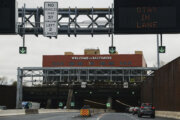CARLEY PETESCH
Associated Press
JOHANNESBURG (AP) — Lesotho’s prime minister fled to South Africa in fear for his safety and will now meet with leaders of the region there to seek peace, he said Sunday.
Prime Minister Thomas Thabane said there had been an attempt to take over Lesotho, a country of about 2 million people that is surrounded by South Africa. Lesotho’s Defense Forces deny any attempt at a coup although they say the military exchanged gunfire and disarmed two police stations in Lesotho’s capital, Maseru, on Saturday.
“I know there was an attempted coup,” Thabane told The Associated Press.
“The mutiny that is happening there is unconstitutional … I came here to make some consultations. And my deputy has continued to run the country, so the constitutional order in that sense is continuing. But there are certain issues that need attention,” said Thabane.
The meeting bringing together Thabane, other politicians from Lesotho, South African president Jacob Zuma and regional leaders is expected later Sunday or on Monday.
A meeting between ministers from South Africa, Zimbabwe and Namibia is taking place later Sunday in an undisclosed location in Pretoria. The representatives of the 15-nation Southern African Development Community will attempt to find a resolution to Lesotho’s crisis, said Clayson Monyela, spokesman of South Africa’s Department of International Relations. The regional group has taken action to resolve conflicts in Lesotho before.
Thabane said of Deputy Prime Minister Mothetjoa Metsing: “I cannot completely absolve him from blame.” Thabane said the deputy has not reported on further security issues, and called that “abnormal.”
Political tensions have been high between the two and within the coalition government in the tiny kingdom since June when Thabane suspended parliament to dodge a vote of no confidence. Thabane’s All Basotho Convention party and Metsing’s Lesotho Congress for Democracy formed a coalition with a third party after 2012 elections and since then conflict has simmered.
“We must remove whatever obstacles that might come before us. We have to mend our relationship and continue to develop our country,” Thabane said in a telephone interview.
There was little evidence of the conflict Sunday in Maseru, where people went about their daily lives.
Lesotho’s defense forces spokesman Ntlele Ntoi said the military had gathered intelligence that the police were going to arm factions participating in a demonstration planned for Monday by one of the coalition parties, the Lesotho Congress for Democracy. The military disarmed police in the capital, Maseru, to avoid bloodshed, Ntoi said.
An exchange of gunfire between the military, youths and police injured one soldier and four policemen, Ntoi said. Radio stations were also off for hours on Saturday.
“The arms have been removed and they are in military custody. The military has returned to the barracks,” Ntoi said, denying reports of any coup attempt. “We are not in a position now or in the future to stage a coup. All we do is to carry out our mandate to secure our country and property.”
The actions bore the hallmarks of a coup d’etat, said Monyela, spokesman for South Africa’s international relations department, and he called for the military to allow the democratically elected government to return to business.
U.N. secretary-general Ban Ki-moon said in a statement released by his office that he is concerned about the reported military takeover in Lesotho and urged “a peaceful and lasting resolution of their differences.”
The U.S. also called on all parties to remain committed to peaceful political dialogue, according to a State Department statement from spokeswoman Jen Psaki.
The demonstration planned for Monday has been called off, according to Lesotho’s news agency.
The landlocked country’s first coalition government was formed in 2012 after competitive elections that ousted the 14-year incumbent Pakalitha Mosisili, who peacefully stepped down from power.
Lesotho has seen a number of military coups since gaining independence from Britain in 1966.
The constitutional government was restored in 1993, after seven years of military rule. Violent protests and a military mutiny in 1998 came after a contentious election prompted intervention by South African military forces. Political stability returned after constitutional reforms, and parliamentary elections were peacefully held in 2002.
Copyright 2014 The Associated Press. All rights reserved. This material may not be published, broadcast, rewritten or redistributed.







